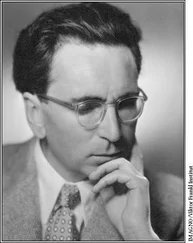One of the most important—and controversial—of Einstein’s mental experiments was the EPR Paradox of 1935, which took its name from the initials of the three scientists who worked together on the experiment: Albert Einstein, Boris Podolsky, and Nathan Rosen. Based entirely on a mental experiment (since the instruments to prove it didn’t exist), the EPR Paradox was an attempt to refute, once again, the quantum physics that so irked Einstein—the same quantum physics he himself had helped bring about. As defended by the Danish physicist Niels Bohr in the so-called Copenhagen Interpretation, quantum mechanics posited, among other things, the notion that chance was no accident at all, but rather a perfectly integral feature of the laws of physics. Einstein, of course, could not accept this idea. “God does not play dice with the universe,” he said to the physicist Max Born, and the EPR Paradox was a way of demonstrating certain aspects of quantum mechanics that he felt were scientifically unacceptable. Bohr and his followers, in turn, insinuated that Einstein had lost his mind.
Bacon belonged, as did Einstein, to the theoretical camp. Ever since the awakening of his youthful passion for theoretical mathematics, he had done everything possible to distance himself from concrete problems, focusing instead on formulas and equations that were increasingly more abstract, and in most cases exceedingly difficult to explain in real-world terms. Rather than struggle with particle accelerators and spectroscopic methods, Bacon chose instead to hide himself away in the far more pleasant realm of the imagination. There, he never ran the risk of dirtying his hands with things like radioactive waste, or exposing himself to dangerous X rays. To carry out his research, all that was required of him were perseverance and ingenuity. It was an approach to physics that, in a way, was a lot like chess.
Princeton, despite being one of the country’s great centers of academia, was an insipid place: too small, too American, too clean-cut, and too hypocritical. And contrary to the supposed “university tradition,” or perhaps because of it, a kind of stiff formality, a sameness, an uncomfortable kind of morality seemed to infect all the relationships one might cultivate there. The university itself was known for having a history of racism and anti-Semitism. To make matters worse, people felt even less able to express any kind of natural, day-to-day happiness, what with the war raging in Europe.
In order to escape these inconveniences, Bacon convinced himself very early on that the one area in which the theoretical world was useless and perhaps even perverse was sex. Theory, when you came down to it, was just fantasy. The tragedy was that almost nobody in the town of Princeton seemed able or willing to accept this basic idea—not the dean, the ministers, the mayor, the professors’ wives, the policemen, the doctors, not even the students themselves. No, they all insisted on performing endless mental experiments on the topic, and in the most unthinkable of places: in church, in lecture halls, in the eating clubs, at family gatherings, while taking their children to nursery school, as they walked their little dogs at sunset. And just like the men at the Institute for Advanced Study, the opaline community of Princeton limited itself to thinking about the pleasures no one dared consummate. For this very reason, Bacon detested his neighbors; they were insincere, provincial, and prudish. In this matter, Bacon could not be pacified with abstraction and fantasy: no intellect—not even that of Einstein—could come close to revealing the abundant diversity of life that was the female gender. Rational thought was fine for articulating laws and theories, for formulating hypotheses and corollaries, but it could never capture the infinite array of aromas, sensations, and pure intoxication swept together in a moment of passion. In other words: Because he was utterly incapable of relating to women of his own social class, Bacon had decided to invest his money in the world’s oldest profession.
In a moment of weakness, he met Vivien. He rarely spoke with her. It wasn’t that he didn’t care about her life or what she had to say—there were lots of women he cared little about yet tolerated long conversations with them. He just wanted to hold on to the idea that there was something mysterious and terrible about this woman. Her eyes, framed by a little halo that shone like a moon in eclipse, had to be hiding some kind of ancient secret, or maybe an accident or a crime, that could explain her evasive nature. Perhaps it wasn’t that at all—he never dared to ask—but he liked holding on to that illusion of living with a difficult soul; he treasured the trepidation he felt whenever he was in her presence. He envisioned Vivien, and with her he felt he could lose himself in a new, unknown land.
This was the closest he had ever come to love. Despite the passion he felt for her, however, Bacon took great pains to ensure that nobody ever caught sight of him walking through the streets of Princeton with Vivien. He always insisted on seeing her at his house, where she arrived with a ritual precision, as if offering up some kind of weekly sacrifice to the gods. Bacon, with the childish pleasure of committing a sin, of breaking an ironclad law, found himself in an emotional state the likes of which he had never known. He threw himself into proving this theory on Vivien between the sheets of his bed, with the tenacity that is the pride of the experimental physicist. Vivien, on the other hand, allowed herself to be manipulated with a serenity bordering on indolence; she had worked at a newsstand for a long time and, given all the alarming news she read daily, nothing could shock her. Vivien’s lovemaking was languorous and sweaty, like dancing to the blues. Her temperament reminded Bacon of that of a quiet little guinea pig or those calm, lazy caterpillars nestled in their moth-eaten leaves, indifferent to their predators lurking above.
As soon as she was finished undressing, Bacon would place Vivien facedown on the bed on the crisp, white sheets and turn on all the lights so he could study that optical antithesis, unbothered, for several minutes. When he was done, he would rest his body on top of hers and cover her with kisses. Every step of the way his lips tested the perfection of those beautiful little spherical equations that he knew he could never resolve. When he was through, he would turn her over as if she were a rag doll, and only then did he undress. Carefully he would separate Vivien’s thighs, and he would then nestle his face in the warm, welcoming space between her legs. This prelude was a kind of axiom from which several theorems emerged each time they came together, and this was where his analytic prowess was evident: this prelude, or groundwork, occasionally led him to Vivien’s tiny feet and, other times, to her nipples, her eyelashes, her belly button. It was more than mere lust: Bacon was studying sex in all its different incarnations, and was observing his own pleasure as it grew and evolved. In the end, the orgasm was just the logical, necessary consequence of the calculations he had mapped out earlier.
“I think it’s time for you to go,” he said to her, once he had recovered.
Maybe he did truly love her, but he just couldn’t stand the idea of her staying in his bed for very long, or having to kiss her when it was all over. By then, the heat they had created and the droplets of sweat that dotted her skin like translucent eyes made him sick—a repulsion as strong as the ecstasy he had just experienced. Suddenly, inevitably, he would become acutely aware of the animal quality of it all, and he couldn’t help imagining them as a couple of pigs rolling around in their own filth. His theory proven, he allowed Vivien just enough time to put herself back together and then he would simply ask her to leave. With the same indifference that, in some way, he sensed in her as well, he would watch her gather up her clothes and dress in silence as if watching an inanimate object or a doll. Once he was finally alone, Bacon felt nothing but sadness, quod erat demonstrandum , and usually fell into a dreamless slumber.
Читать дальше












